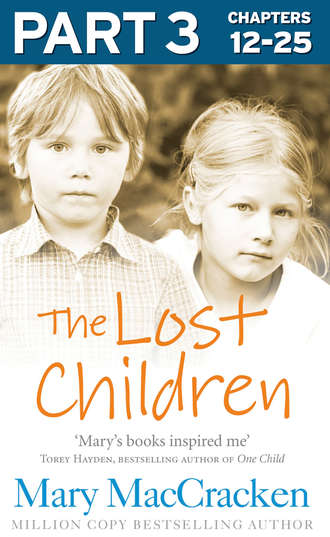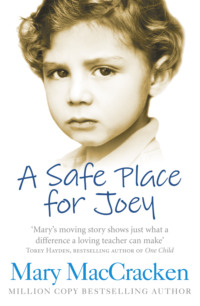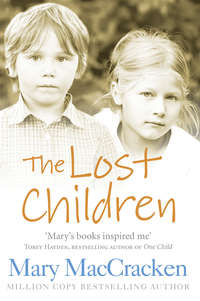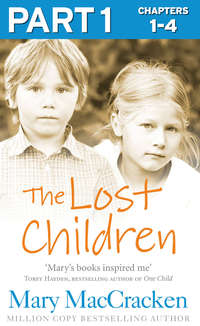
Полная версия
The Lost Children: Part 3 of 3


Contents
Cover
Title Page
Chapter 12
Chapter 13
Chapter 14
Chapter 15
Chapter 16
Chapter 17
Chapter 18
Chapter 19
Chapter 20
Chapter 21
Chapter 22
Chapter 23
Chapter 24
Chapter 25
Teacher
Coming soon …
Exclusive sample chapter
Copyright
About the Publisher
Chapter 12
“I don’t know anything at all about team teaching,” I say to Dan.
“You’re an expert.”
“How’s that? How did I get to be an expert?”
“Because it’s just what we’ve been doing the last couple of months, combining our classes, except that next year we’ll be in the same classroom all the time. One big room for eight kids instead of two small ones. See, the thing is this. Doris wants to bring in six more kids – two more for you plus one more teacher and four kids. And if you and I combine in the big room, that will free one of the rooms for the new class.”
“And our room? What will that be like?” I ask, trying to get a picture.
“It’ll be good. Open. The kids can work in small groups; we’ll have two aides each morning, so that will be four of us. We can get a science project going – art, reading, math – and the kids can move back and forth between the groups. Freedom in a structured setting.”
“Where’s the structure?”
“Us. We’re structured. We believe in the same things, the same kind of discipline, responsibility. We let the kids grow at their own pace, provide the materials and help if they need it; let them test themselves with us … For God’s sake, I can’t put it in words … you know what I mean.”
I did. I knew.
“What does Doris think?” I asked.
“She’s all for it. She wants more kids, hopes eventually to have room for forty in the new building. Besides – more kids, more money.”
“Dan. That’s not fair.” This was one of the few things we disagreed about: the Director. Dan was antagonistic toward her, whereas I felt an increasing respect for this woman who had managed to found the school and keep it operating for thirteen years. And her dream was coming closer. There was an architect’s rendering now of the new building. Formal fund-raising was starting. Dan found her stubborn, unwilling to change; he disliked the way she said one thing one day, another the next, agreeing with the psychologist during staff meetings, disagreeing with him after he left.
To me – she survived. And kept us all surviving with her. There was tremendous strength inside her slender body and she used every ounce of it, playing the odds, swaying back and forth, it’s true, like a tree in a storm, this way toward the board of trustees, back to the teachers, leaning toward the professionals, bending to the parents; but this was her secret of survival. The pressures upon her were incredible. She could not remain rigid or she would be felled. She was strange about money, fishing old broken crayons out of the wastebasket, cutting up partly used paper for scraps. But she used the scraps. She sacrificed for her dream – the new school.
Dan was not concerned with some future dream: he was young, he was interested in now. He wanted good conditions, good supplies of materials for his kids right now. Why should they, his boys, suffer for some old woman’s distant dream?
Dan’s other complaint was that Doris did not visit the classrooms enough, was not in close enough touch with the children, the teachers. She was not, he said, aware of what we were doing and trying to do. Consequently, Dan, like a child himself, felt that if she didn’t care enough to find out, he had no obligation to inform her.
But again the fact remained: we did survive, and more than that, we grew. Through all our crises, big and small – in spite of ourselves. Matthew on the mountain, for instance, could have been a tragedy, but wasn’t. Now in some strange way our classes were closer than ever. We had known fear and not been torn apart by it; we had made mistakes and not turned on each other. Matthew was no longer so wild; when we crossed even the small street to the graveyard he came and put his hand into mine, never looking at me – but our hands clasped as we crossed the street.
In any event, for once Dan and Doris both wanted the same thing, though for different reasons. Doris wanted more children; Dan wanted to try the concept of team teaching. Whatever my reservations were, they seemed small in the face of their united decision.
“All right,” I said, “let’s try it.”
The last days of school were hot. We worked hard, conscious of trying to prepare the children for summer, give them as many skills, as much self-reliance, as we could, then staying late in the afternoon, planning for the next year. It was hard to say good-bye. Tired as we all were, we had grown used to each other and were conscious of how much we would miss one another.
We had a final party in place of the usual staff meeting. We held it in Jerry Cramer’s backyard, out on the flagstone terrace, overlooking a long meadow filled with apple trees and bordered by low stone walls. The terrace faced west and the late afternoon sun hung over the low range of mountains that rose at the end of the meadow.
Jerry was our psychiatric social worker; he was also a psychologist. He spent more time at the school than the other professionals, often without pay. He had a long, soft, gray mustache, steel-rimmed glasses, and a gentle manner. Though he had his human failings (always trying to stop smoking, which never lasted more than a day), he loved the children and they knew it. They would often go of their own volition to stand beside him or sit near him at Circle.
Dr. Marino, our psychiatrist, was there too. Reserved, always at a slight distance from all of us, but able, informed; I wished there was some way that he could spend more time at the school.
There was no shop talk that day, only gentle jokes and reminiscences. Zoe drank martinis and sat on the flagstone terrace like a small guru. Only our speech pathologist was absent.
I knew I must go – Rick’s high-school graduation was that night – but the tenderness I had felt all year had risen to the surface, floating on Jerry’s bourbon, and it was difficult for me to leave these people. I kissed Zoe and hugged Doris, surprised at myself; I was not usually a woman hugger.
Then Dan walked me to my car parked in front of the house, opened the door for me and waited while I found the key and put it in the ignition.
“How about working with me this summer, Mair? I’ve already got eight kids signed up for the summer program and there are a lot more prospects. I’ll need help. How about it?”
I wanted to. Rick was driving cross-country with friends before college; Elizabeth had been asked back to camp as a junior counselor. I wanted the work, the children, the closeness – but I had problems to resolve in my marriage; I could not retreat from them into the joy of teaching.
I turn on the ignition, and regret makes my voice formal. “Thank you, Dan, but I can’t. I’ve made other commitments.” And the word stands formal and strange between us.
Dan leans his arms on the edge of the car window and bends his big frame until his eyes are only an inch from mine, and I turn my head away before I say, “Good-bye, Dan. Good luck. Ill see you in the fall.”
He leans there looking at me, not moving, holding the car door, and then finally he straightens, “Take care, Junior. Take care of yourself this summer.”
I left then and drove down the highway in the heat of the late afternoon, but before I have gone a mile I pull to the side of the road and put up the top of my convertible. Even with the heat I put the top up, and put my own polished shell back on as well.
Chapter 13
I went to the marriage counselor alone. I tried to persuade Larry to come with me, but he said it was ridiculous because there was nothing wrong. I thought perhaps it was true – it might be ridiculous, but for the opposite reason: everything was so wrong it could not be put right.
I sat opposite the tall, distinguished psychiatrist – shy, not knowing what to say, intimidated by the black leather couch on the outer rim of my vision. Will he ask me to lie down?
“Yes …?” he says.
I try to tell him about all the good things and the bad. My voice seems far away. I can hear it while I am talking, and it is almost as though I am speaking about another person. I talk about our children – and Larry’s and my good physical relationship, and the lovely house and tennis – but when I try to tell him about the bad parts, I find I cannot talk about them very well; all the reserve I was taught as a child, the New England sense of privacy, wells up and sorrow fills my throat.
“Humph. Now. So. Do you think you are beautiful?”
Surprise makes me raise my head and look at him. “No,” I say. “No.”
All angular and lean is Dr. McPhearson, but now he smiles at me, a slow, kind smile and I like him suddenly.
“Ahhrph.” This man has his noises, too, not so different from the children. “So. Well, do you feel you are intelligent?”
“A little. Some. I can think better than I can talk.”
It is easier to talk now, and I tell him more. How it will not be as difficult to live with Larry with the children gone next year, Rick to college, Elizabeth to Kent. How we never fight, Larry and myself – how if I could just be content with the things I have, it would probably be all right; but there seems to be so much emptiness. And then, there is all this love, and I don’t know what to do with it. Larry doesn’t really want it. I don’t blame him – it’s too much. It gets too much for me too. I get all filled up with it and I have to let it out. Do you think maybe it’s like too much fat – that it could be slimmed down?
“The school,” he suggests.
“Yes. I am good at that,” I say. “I love teaching there, but, I don’t know – it’s hard to say it – but you see, anyone could do that. I mean either a man or a woman could do that kind of loving and it’s – the school is – good for that part; but there’s this other part of me that loves only like a woman. This part is for a man. I love being a woman …”
He takes off his glasses and smiles again, a small, tired smile.
“Yes,” he says. “Can your husband come with you next time?”
Larry almost came, but then he was detained at his bank in the city and so I go alone again. This time we talk about the laser: Light Amplification by Stimulated Emission of Radiation. Delicate, intricate, powerful. Energy harnessed from a larger source. Is it possible that love could be like this?
On the fifth visit he says unexpectedly, “What will you do if you leave your husband?”
“I’ll teach.”
“And how will you live? Who will take care of you? Have you ever lived alone?”
It seems amazing to me. I realize I never have. I have never spent a night alone. First my parents – overnights with friends – college, roommates – Larry – my parents when he was in the army – the children.
“No,” I say. “Not really. But I am sure that I can learn.”
Dr. McPhearson called Larry and arranged an appointment, and Larry went first alone and then with me. He explained carefully to Dr. McPhearson how there was nothing wrong, that I tended to be too sensitive, imagine things.
I sat silently, listening, shrinking, getting smaller again.
“Hrrmph. Ah. Mmph.” Dr. McPhearson clears his throat, and the familiar noises cheer me. “Well, Mary. What do you say?”
“I am going” – sounding stubborn, I knew, unreasoning – but it would take so little. It would be so easy to stay.
Dr. McPhearson recommends that I take a trip. Living alone is different from thinking about it, he says. Larry is enthusiastic. Just what she needs, he says – a trip, to get away from it all. He likes the doctor, and I am glad. He will need someone to talk to.
I go for one more visit.
“Ahhh,” he says, even before we begin. “I am sorry. Perhaps if you had come ten years ago …”
I shake his hand before I go. Is that how you say good-bye to a psychiatrist?
“Thank you,” I say, “for all your time.”
“Yahrmph.” A combination of yes and throat-clearing. “Is there anything more? Anything I can do? Where will you be?”
“California, I think. I’ve never been there.”
He stands silently.
“There is one other thing,” I say. “The guilt. I feel a big ball of guilt … Here.” I touch my stomach. “Is there anything I can do about that?”
“Guilt. Why is that? What do you mean, guilt?”
It is so difficult to tell him and I think again how hard it is to communicate through words, and I marvel to myself that we all do as well as we do. We are all interpreters by necessity, even though we are not trained or suited for the profession. Simultaneous interpreters, hearing one language and then speaking another, our own. Ahh, we need more tolerance, more admiration for one another.
“I feel guilty about leaving him alone. Who will make the coffee in the morning or put flowers in the silver bowl? And the animals, will they be all right? How will Larry know how to order the meat or which slipcovers to send to the cleaner’s? He doesn’t know how to work the dryer or where I packed his winter things …” I stop in confusion.
“You are not his mother, Mary?”
And I want to say, I know, I know, and yet, part of me is. Just as I can see separate parts of me, parts that are satisfied working with the children and other parts that are man-oriented, so I also see blended centers of me. Where does the mother end and the lover begin? Which is student, which teacher? Is being a wife supposed to be a separate, isolate thing? I do not think it can be.
But before I can speak again Dr. McPhearson interrupts my thoughts. “It will be all right,” he says. “It is like grief – the guilt – you must just work it through.”
Chapter 14
Coming in from the hot June air, I notice that the halls of the school are cool and dark, strangely quiet and empty without the children. The Director is there, though, talking on the phone, and she waves as I walk through her office on the way to my classroom.
There are books and papers I want to take with me to California, and I had thought merely to drop by the school and pick them up. I had not realized how strange the school would seem without the children, and now as I kneel in front of the small white bookcase thumbing the speech manual, images of Brian and Matthew superimpose themselves upon the pages and I cannot concentrate.
The Director’s voice floats down the hall, echoing in the silent spaces: “I think it’s going to come out all right, Arthur. I’ve just gone over the books again and I’ve made a list of the most urgent bills. Yes. I know. There are quite a few, but a lot of them we can stall until fall. We’ll be all right then; the school boards will be sending in half of the tuition.”
Arthur must be Arthur Siegal, the school’s accountant, Doris’s cohort in fighting the never-ending battle against the drain of money.
“Yes, all right. I can give you the list of the ones I’ve marked most urgent now, but I’d like to get together with you soon, get these things paid before I leave. You didn’t? Oh … Guatemala. No, no, just for the summer, teaching in one of the colleges. I’ll be back in the fall.”
Doris reads off a list of names and amounts, including bills from the phone and electric companies. “No. Skip that. Leave it until fall.”
Irritation now in her voice, no cheeriness, just irritation and weariness.
“Arthur. Look. I told you – I don’t need it. I know I didn’t get last month’s salary either; I can read the books as well as you. But I don’t need it. I’ve got my ticket in my pocketbook, groceries till the end of the week, and I’ll get an advance when I get there.
“The Board meeting is Thursday night, you know that, and I want to be in the black. I mean I want the school to be in the black. When you read the figures to the Board, I want them to look good, positive. The Board’s enthusiastic now; the fund-raising for the new school is moving right along. If they think we’ve gone in the hole they’ll let down, get discouraged.
“Mmmm. Right. Well, that’s your job, Arthur. You print up the sheets so they don’t notice my salary’s not there.
“All right. Good. Thanks a million. See you tomorrow then.”
Chris and Brad and Tom and Billy, Ivan and Jeffy, and more, more. All the children of the school join the images of Brian and Matt; all the children Doris has made room for, all the problems she faces without complaint.
Unexpectedly, she appears in the doorway of my small classroom. “Mary, how are you? Can I help you with anything?”
“No,” I say. “I’m just picking up some books to go over during the summer. Did I hear that you’re going to Guatemala?”
She sits down quickly on one of the tables; her bright brown eyes move over my face as if to read me, to see how much else I have heard.
“Yes; I’ve been there before. I’ve found it’s good to get away, get a change of scene during the summer.”
We sit quietly, Doris and I, in the dim classroom until she says, “Fourteen years now since I opened the school. We started with just four children – half a day.”
“How did you know about them? How did you think to open a school for emotionally disturbed children?”
“Well, you know, when you look back, it’s strange how it happened. The parents really began the school. They got the idea, four of them, and then came to me and asked if I’d be in charge.
“I’d done all kinds of things when I was younger. Then I began teaching and it turned out that I had a knack with the ‘problems,’ as the other teachers called them, and one thing led to another, and the next thing I knew, there we were starting the school.
“Harry … well, I wish you could have known him. He supported me all the way, baby-sat at night with Mike while I got my master’s, built furniture for the school, painted walls. I didn’t marry until late, but he was worth waiting for. I could never have started the school or kept it going without him.
“I remember right in the beginning, fifteen years ago, saying to him, ‘Harry, I don’t know anything about emotionally disturbed children,’ and him saying, ‘Well, Doris, it doesn’t sound to me like anybody else knows either, and at least you admit it.’”
I smile at Doris; she makes it seem so real. I can almost picture Harry.
“We built our own house, you know, little by little. Bought the property, then put it up a room at a time, and while we were measuring or painting or laying the bricks I’d tell him about the children. He knew each one as well as I did, and he helped me a lot more than anybody else. Had a listening heart, Harry did.”
Doris is quiet for a while; I can almost hear her listening to me, though neither of us is speaking. If Helga and I have a body language, Doris has an inner ear and she somehow knows things long before they are put into words.
Now she says, “I was a funny kid. Always bringing home sick cats or birds with broken wings; had a regular clinic in the backyard of our house when I was young. I must have nearly driven my mother crazy, but she never said a word until the summer I brought home Leland Hagstrom. He was handsome as anything, but weak – drank like a fish, couldn’t seem to leave the bottle alone. After supper one night that summer my mother took me out on the back porch and asked me how serious I was about Leland. I was pretty serious; he needed me, or said he did – and I liked that.
“I’d never lied to her and it didn’t occur to me to do it then, so I told her the truth, that we were thinking of getting married. You know what she said? ‘You’re a fool if you do, Doris. I’m not one to interfere, but remember’ – and I’ve never forgotten this – ‘remember,’ she said, ‘never do your social work at home.’”
Doris sighs and gets off the table. “Well, I didn’t marry Leland. I waited, and after a while I met Harry and we had a love affair that lasted thirty years … I don’t know what made me think of it now; I must be getting old, rambling on like this. Well now, you get to work, don’t let me keep you. Where are you off to for vacation?”
“Oh,” I say, “California, I think.”
“It’s a beautiful state; you’ll like it. Have a good summer now; I probably won’t see you until fall.” Another cheery wave and Doris disappeared out the door.
I finished gathering my books and papers, thinking all the while about Doris. Had she just been rambling on or in her own way had she been giving me advice? In any event, before I went home I drove five miles beyond the school and put a deposit on one of the new apartments that would be completed in the fall.
Chapter 15
I am back from California and settled in my new apartment a week before school opens. The apartment is small and there is not much furniture, but it is carpeted in gold and open on both sides so that the morning sun pours through the bedroom and living room and the afternoon light fills the small kitchen and dining room.
Larry’s and my separation is complete, the final papers signed; only the formality of the divorce remains, and this has been postponed until January for tax purposes.
Elizabeth and Rick are back in school, tanned and healthy from the summer, and my own impatience to begin work, to see the children, wells inside me.
Bedlam. The first day in our new room is bedlam and Dan and I barely have a chance to speak to each other. Eight children in the room. Supposedly four are mine and four Dan’s, but we can never remember exactly who is whose.
Brian is back, taller, still flapping.
“Hey, Bri, did you have a good summer?”
“Mary. Mary. Is your father dead?”
What is this now? “No. My father isn’t dead. Why?”
“Where does he live?”
“In Guilford, Connecticut.”
“Yule O’Toole lives in Guilford.”
“Who is Yule O’Toole?”
“Yule O’Toole is dead. I thought maybe you were dead, too – the summer was so long.”
“Not me, Bri. I’m going to be around for a long time. I’ve got a lot to catch up on.” Later I found out that Brian’s grandfather had died during the summer.
Stuart comes sliding in the door.
“You look perfectly darling this fall, Mary.”
“Thank you, Stuart. I’m glad to see you.”
“Shit,” he says and kisses my hand, licking it with his tongue. Jeffy Olivero and his widowed mother have disappeared without a trace over the summer, and I wonder if he still sleeps beside her, pressing her earlobe between his thumb and forefinger, wherever they may be.
Tom and Ivan, Dan’s boys from the year before are back; the new room is strange to them and Ivan whirls and jumps in one corner, his beautiful face a silent mask, while Tom pulls up his turtleneck and paces back and forth along the wall.
“Good morning, Tom,” I say.
“Good morning, Tom. Goddamn fucking son of a bitch. Lost on the mountain. Call the one o’clock call.”
And I know that he remembers me, although I am not so sure that he is glad to see me in this new room. Changes are difficult for all children; for ours, they are doubly so. Their own self-image is so fragile that any alteration in the immediate external environment is a major threat.






